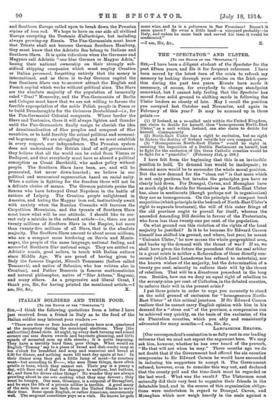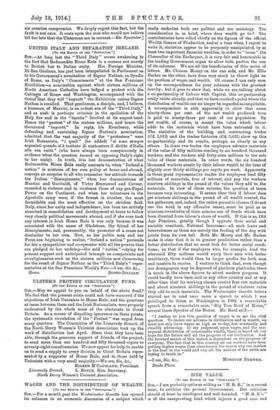THE " SPECTATOR " AND ULSTER. [To THE EDITOR Olr
THR "15YEG7ATOlt..1 SIR,—I have been a diligent student of the Spectator for the past fifteen years, and file it for frequent reference. I have been moved by the latest turn of the crisis to refresh my memory by looking through your articles on the Irish ques- tion during the past two years. Events have made it necessary, of course, for everybody to change standpoint somewhat, but I cannot help feeling that the Spectator has
moved from solid ground to shifting sands in following the Ulster leaders so closely of late. May I recall the position you occupied last October and November, and again in February of this year P It may be summed up in three points
(1) If Ireland, as a so-called unit within the United Kingdom, can claim to decide for herself, then "homogeneous North-East Ulster," as a unit within Ireland, can also claim to decide for herself. Consequently (2) North-East Ulster has a right to exclusion, but no right to dictate the destiny of Ireland outside her own compact area. (3) "Homogeneous North-East Ulster" would be right in resisting the imposition of a Dublin Parliament on herself, but to fight for the exclusion of the three Catholic counties would be to fight for a "punctilio." (February 21st, p. 288.)
I have felt from the beginning that this is an invincible position to hold. To demand lees would be inadequate; to demand more would be to surrender the whole moral position.
But the new demand for the "clean cut" is that more which is not only perilous, but invades the principles you have so
clearly laid down. For Donegal, Cavan, and Monaghan have as much right to decide for themselves as North-East. Ulster has, since in sentiments (though perhaps not in organization)
they are as homogeneous. On the principle of compact local majorities (which principle is the bedrock of North-East Ulster's right to separate treatment), the will of this outer fringe of the old province ought to prevail for itself; whereas the amended Amending Bill decides in favour of the Protestants, who form less than twenty-one per cent. of the population.
On what ground can this violation of the rights of the local majority be justified? Is it to be because Sir Edward Carson himself has shifted his ground, and where, last year, he meant "Unionist Ulster," he now means the whole geographical area, and backs up the demand with the threat of war ? If so, we shall have given the future the precedent that the real arbiter in a great crisis is neither a Referendum of those directly con- cerned (which Lord Lansdowne has refused to entertain), nor the known wishes of the majority, but the determination of a twenty per cent. minority to enforce their will by the threat of rebellion. That will be a disastrous precedent in the long run. Besides, how can we deny an equal right of rebellion to the seventy-nine per cent. of Catholics, in the debated counties, to enforce their will in the present crisis P I put these points in order to urge you earnestly to stand on the solid ground of exclusion for "homogeneous North- East Ulster" at this critical juncture. If Sir Edward Carson realizes that he cannot carry English opinion with him in his demand for a "clean cut" of the province, a compromise can be achieved very quickly, on the basis of the exclusion of the six Plantation counties, which you ably and consistently
advocated for many months.—I am, Sir, &c.,
LANCASHIRE READER.
[Our correspondent's contention is so fully met in our leading columns that we need not repeat the argument here. We may
ask him, however, whether he has ever heard of the proverb, "He that will not when he may." Three months ago we do not doubt that if the Government had offered the six counties compromise to Sir Edward Carson he would have succeeded in inducing his supporters to accept it. The Government refused, however, even to consider this way-out, and declared that the county poll and the time-limit must be regarded as the last word. What was the result ? The 'Ulstermen most naturally did their very best to organize their friends in the debatable land, and in the course of this organization obliga- tions were undertaken in regard to Donegal, Cavan, and Monaghan which now weigh heavily in the scale against a six counties compromise. We deaply regret this fact, but the fault is not ours. It rests upon the men who would not believe till too late that the Ulstermen are in earnest.—ED. Spectator.]











































 Previous page
Previous page